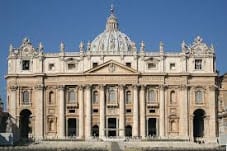The tattoo taboo which kept many people from even getting inked in the past has been lifted causing many Christians to ask whether they should join the growing trend. This seemingly harmless form of self-expression coupled with silence from the Church renders us subject only to our personal inclinations. But is this really the case?
Before addressing the question directly, a digression is necessary. In an age where “freedom of conscience” is over-emphasized, we can fall into the trap of thinking that if the Church has nothing to say about a given topic then we are free to decide for ourselves. But this type of thinking can be morally harmful. What the Church does for us is to provide moral principles by which we can freely (in the truest sense of the world) govern our own lives. She will teach those principles through specific instances, especially where the application might not be very clear or the offense is particular egregious, but in general we should not expect the Church to speak on every single topic. Nor should we simply assume that all is well because the Church has been silent. We instead must see what moral principles are involved in our decision.
Secondly, we have to admit, especially in an age of exaggerated Gnosticism, that we are both body and soul. Something permanent like a tattoo is not just a change to our body, but a change made to our person. In this way permanent tattoos are different than something like a temporary tattoo, drawing on our skin or even wearing a particular outfit. A permanent change, being a different moral object, likewise carries a different moral weight than a temporary change.
Biblical Prohibition?
Turning, then, to the question of tattoos, we have to ask what moral principles are in play. Within Evangelical circles, these moral principles are clearly laid out in Sacred Scripture. Leviticus 19:28 says that “You shall not make any cuttings in your flesh for the dead, nor print any marks on you: I am the LORD.” Many other Christians are quick to point out that this particular precept is not binding upon Christians because it belongs to the Jewish ceremonial law. I will leave it to more erudite biblical scholars to argue this particular point without weighing in, but it seems this approach could lead us into an unnecessarily deep Scriptural rabbit hole. What can confidently be asserted however is that specific prescriptions are given for specific reasons, at specific times and in specific places. But the underlying principle remains intact. Christ did not abolish the law, but fulfilled it.
Tattoos were used as marks to show who the bearer belonged to. Slaves bore the marks of their masters, soldiers the marks of the general and worshippers the sign of their deity. Because the Jews were told from “the beginning” that they bore in their very person the image of their Deity, they were prohibited from getting tattoos. They already were marked with the sign of their Master, their General and their God and to bear a mark of another would be tantamount to a lie.
It is this fundamental principle, namely, that man bears the image of God in his person that motivates the proscription in Leviticus and also motivates the Church’s teaching on the immorality of any bodily mutilation. The principle of totality and integrity says that we may not modify the body of a person except in the case of medical necessity or to restore proper functioning, including necessary cosmetic changes (like when a person is burned or physically deformed in another way). Put in more religious terms, those things that make the sacrament of the body reflect the image of God are good while those things that mask the image of God are not.
This is why something like makeup would be in a different moral category than tattoos. Makeup, when modestly applied, should enhance the beauty that is already present in the person. It draws attention to the image of God in the person. Too much makeup on the other hand only serves as a mask and hides the reality of the person as she really is. A woman who wears makeup that modestly draws attention to her eyes bears no moral fault, while a woman who attempts to hide her wrinkles by applying a ton of makeup is trying to cover up more than the wrinkles (in essence lying about her age). It is a question of enhancement versus alteration.
Tattoos and Bodily Mutilation
Returning now to the question of tattoos, the meaning of tattoos may have changed so that they are no longer marks of ownership, but the underlying principle remains valid. It also seems very obvious that someone who covers themselves with tattoos has mutilated their body. But what about the person who wants a single tattoo? We return to the question of whether the one tattoo is an enhancement, namely, it helps to see the image of God more clearly, or is it an alteration? It seems, rather unavoidably, that it amounts to a bodily alteration and therefore is a form of bodily mutilation.
There are many who will object that bodily alteration is perfectly fine. Isn’t that what we do when we go to the gym? These are fundamentally different however. Changing your body through working out cooperates with a natural process. Tattoos do not. They are more like the man who gets pectoral implants than the man who spends his time bench pressing.
Most people would not go through the moral calculus we just did. Instead they view tattoos as a form of self-expression, like the person who wears mismatched socks or only one color shirt. This however falls back into the Gnostic/Dualist trap. The body is not something I merely wear, but is me. That I have to add something to my person so that I can express myself seems like an oxymoron. We have been given many natural powers by which we express ourselves. Plus in the majority of cases the meaning of tattoos is hardly obvious. That is, they fail as a means of self-expression because they do not adequately express their meaning.
There is one last reason why someone should avoid tattoos and it is based on a principle of St. Francis de Sales. The saint thought that there were many things that on the surface seem to be morally permissible, but once we examine them we realize they are fraught with moral danger. While I don’t think tattoos pass the first test, even if they do, they fail the second as well. So much of the moral life is about why we do what we do and there are not a lot of good reasons to get tattoos. Most of our personal reasons center on our own vanity. After all, why would we have them except to draw attention to them? There is also the temptation to dress in a way that shows them off, which can also lead to immodesty and unchastity.
There was a time not too long ago where tattoos were considered taboo—signs of being a fringe dweller in society. But in recent times they have gone mainstream with some estimates of 1 in 5 Americans having one. Despite their popularity however, Catholics should think twice before slinging the ink.
















